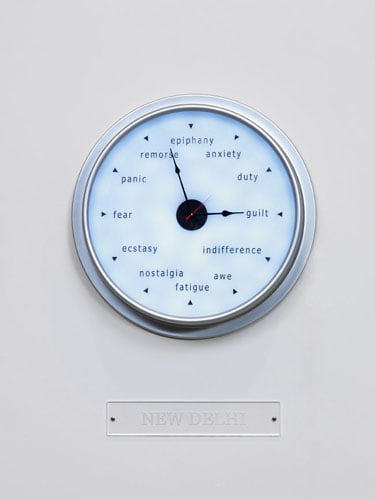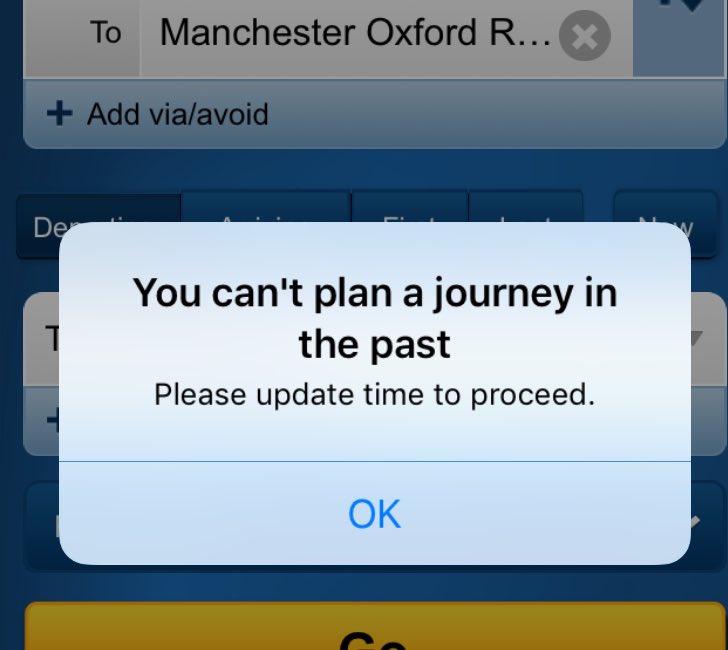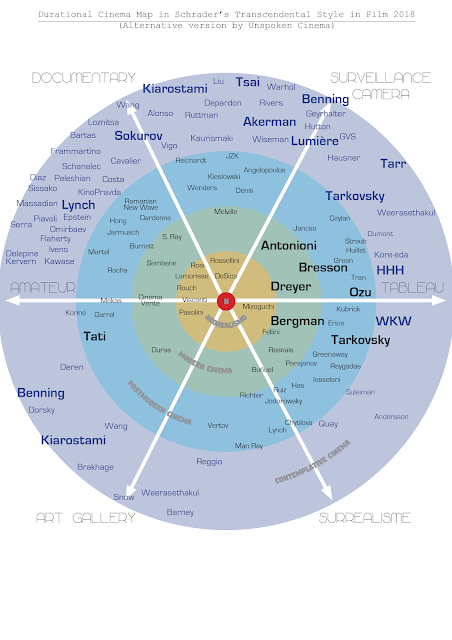EN2G4/EN3G4 Literature, Theory and Time
Convenor: Liz Barry
Module Outline
This course, open to second and third year students, introduces students to theories and philosophies of time in relation to some literary and cinematic texts that involve themselves closely with temporality (Woolf's Mrs Dalloway (1924); Ali Smith's novel The Accidental (2005); Marion Coutts' illness memoir The Iceberg (2014); Maggie Nelson's work of 'autotheory' The Argonauts (2015); Christopher Nolan's film Memento (2000) and Barry Jenkins' film Moonlight (2017).
We will be thinking about how time is represented in these narratives: how narrative helps us imagine the past and the future; how tenses and other languages of time create affect; how space and time are brought into relation via narrative structures, concepts, images, metaphors. We will consider the relatively recent history of standardized time, and the effects of this on patterns of work and leisure and on concepts of the self and political identity. How were ideas of the past and the future invented? We will think about subjective experience of time in relation to emotional states such as anxiety, boredom and desire, and how time is experienced in states of mental disorder. We will think about time in relation to the body, illness, chronic conditions, bereavement and the temporality of (health) care.
We will also think about our own experiences of time, in the recent pandemic, in our experiences of illness and grief, in relation to our identities and different experiences and transitions between life stages, in relation to race, sexuality and age; in relation to the planet and the non-human.
The critical and theoretical tools you will learn in the first few weeks of the module will be valuable in helping you 'read' works on this module but also on your other English modules (and almost any module that engages with texts, narratives, history, psychology or philosophy).
...the infinitely variable gearbox that links the told to the ways of its telling, ...how the narrative discourse works to subvert, replay, or even pervert the normal passages of time. (Peter Brooks in the brilliant Reading for the Plot on what Genette reveals to us about narrative)
NB. It will be helpful to you to have read at least the first few chapters of Woolf's novel Mrs Dalloway before the start of term. If you can't get hold of a copy, there is a Project Gutenberg version freely available online. But it would be best for you to purchase the OUP or Penguin versions for the term's work if possible. Think about the depiction of time in the book. How much time is passing? How do past, present and future relate to each other? What is the relationship between time and emotion? How do altered mental states affect the perception of time? There will be a light-hearted quiz in the first week (on more superficial, factual matters than these) so you can evaluate how much you've picked up from the novel so far.*
Think too about the reading and watching (and other cultural consumption) you're doing this summer -- are you being made particularly aware of time in any aspect, and if so how? It would be nice to hear about these experiences in our discussions.
Do have a look at the module's past padlets for a range of quotations, gifs, memes, allusions to time (and illness), from the sublime to the -- not-so sublime: Literature, Theory and Time padlet (1) Illness TimeLink opens in a new window
A critical 'reading package' will be distributed to you in or before week 1 with the key theoretical readings for term 1.
A further overview of some of the texts we will be reading can be found here in the Oxford Research Encyclopedia entry on Literary Theory and Time.
Introductory video for the module
Assessment
Intermediate Years:
[1 formative short piece (700-1000 words);] 1 x 3000 word essay (40%) Term 2, Week 1 Friday 10.01.25;
1 x 3500 word reading journal (60%) Term 3, Week 2 Friday 02.05.25
Final Years:
[1 formative short essay (700-1000 words);] 1 x 4000 word essay (40%) Term 2, Week 1 Friday 10.01.25; 1 x 4500 word reading journal (60%) Term 3, Week 2 Friday 02.05.25
Reading journal
4 entries
Each entry will pair ideas about time from one or two of the theoretical sources with a piece of fiction, literary non-fiction, film, or other cultural artefact, and make a reading of the 'text' in relation to the idea(s) in question. One of the four entries can be (but doesn't have to be) applying the theory we've looked at (or other time-oriented theory) to your own lived experience.
The entries can vary in length to make up the allotted word count (+/- 10%), but shouldn't be less than 500 words or more than 1500.
Below are some anonymized samples from previous years:
Syllabus
(Sensitive content is indicated with a 'CW' for 'content warning', with some brief indication of the nature of the content.)
Term One
Week One: Introduction
Reading:
Mrs Dalloway, up to page 80.
Extra resources:
You may like to read an article in the New Yorker about why people have been reading Mrs Dalloway during the pandemic, for a topical angle: Why Why Anxious Readers Under Quarantine Turn to Mrs. Dalloway
Week Two: Time in Narrative
Reading:
Mrs Dalloway, to the end.
Gerard Genette, Narrative Discourse, "Introduction," "Order," "Duration"
Genette handout -- *key* preparation for Week 2 seminar
If you have time/interest to think about further questions :
Questions re. the Woolf passage re. psychoanalysis and narrative
Slides:
Some weeks I have included the slides of mini-lectures -- I will go through any essential material in the seminar, but if you need to have a look at some online resources ahead of time or afterwards, there are slides, and -- in weeks 2, 4 and 8, hastily made videos -- from my pandemic teaching:
Time in Narrative (Genette and Woolf) -- slides
Powerpoint videos -- Time in Narrative (week 2)
Week Three: Space and Time
Reading:
Mikhail Bakhtin, “Forms of Time and Chronotope in the Novel” The Dialogic Imagination: Four Essays, (UTP, 1981), pg 84-258.
Handout -- guide to Mikhail Bakhtin's chronotope
Watching:
Christopher Nolan (dir.), Memento (2000)
Slides:
Space and Time (slides) -- Week 3
Week Four: Phenomenological Time
Reading:
Henri Bergson, from Time and free will: an essay on the immediate data of consciousness - Library Search (serialssolutions.com) pp. 75-139 (focus on pp.90-139: from 'It is advisable to' to 'give up its symbolical substitute.')
[or see Time and Free Will: section collected as 'The Idea of Duration' in Henri Bergson, Henri Bergson: Key Writings, ed. Keith Ansell Pearson and John Mullarkey (Continuum, 2002)]
Gilles Deleuze, Cinema 2: The Time-Image, trans. Hugh Tomlinson and Robert Galeta (London: Athlone Press, 1989): pp. 5-10, 18-24, 134-47 (see digitized PDF on TALIS).
Bergson and Deleuze -- questions to prepare for next week
Slides
Phenomenological Time -- SlidesLink opens in a new window
Extra resources:
Bergson:
BBC Radio 4, In Our Time: Bergson and Time (particularly recommended as this is challenging material -- but don't worry if it's a bit baffling, we will draw out what's important and useful in the session).
(listen to particularly 05.08 -- 8.25; 10.42 -- 15.56; and 17.52 -- 25.18 but it's all good value. Around these sections on the philosophy, there are discussions of his theory of evolution (how new things come into being), and his clashes with Einstein and the new physics, for instance)
Rock Star Philosopher -- Emily Herring on Bergson
Emily Thomas on The Philosophy of Time and the New Thinking about Time in C20 (video) -- listen to 06.10 -- 08.50
Deleuze:
Slides on Deleuze, the time image, the chronotope and film (in particular Memento)
Slides AND VIDEO on Deleuze, the time-image, the chronotope and film (in particular Memento)
Slides AND VIDEO on The Shining, Bergson and Deleuze's Time-Image
Week Five: Mrs Dalloway and other critical approaches
Reading:
Kimberly Engdahl Coates's 'Virginia Woolf's Queer Time and Place: Wartime London and a World Aslant', in Queer Bloomsbury (2016), pp. 276-293. Available on TALIS.
Woolf on how her contemporaries were responding to the shock and destabilizing impulse of World War One:
Woolf's How it Strikes a Contemporary (virginia.edu)
Woolf and mental health: Patricia Waugh, 'The novelist as voice hearer', The Lancet (2015); Michael Whitworth on <em>Mrs Dalloway </em>and mental health (critical survey)
Week Six: READING WEEK
Week Seven:
Reading:
Ali Smith, The Accidental
Week Eight: The Future
Reading:
Stephen Kern, 'The Future', The Culture of Space and Time: 1880-1918 (Cambridge: Harvard University Press, 1983)
Slides:
Heidegger, the Future and (Existential) Anxiety (video and slides)
Week Nine: Time and Non-Normative Mental States
CW: mental illness, trauma
Reading:
Eugène Minkowski, from Lived Time [1933], trans. Nancy Metzel (Evanston: Northwestern Press, 1970)
Matthew Broome, 'The Neuroscience, Psychopathology and Philosophy of Time', Philosophy, Psychiatry & Psychology, 12: 3 (2005), 187-194
Judith Herman, from Trauma and Recovery (1992)
Preparatory handout on Non-Normative Mental States and Time
Extra resources:
Non-Normative Mental States, Mrs D and The Accidental (ideas, exercises)
A bit leftfield, but a talk (slides and video) I have written on dementia, time and laughter -- tangential link to the Minkowski!
Week 10
Recap, informal feedback.
Other supplementary term 1 materials:
Talk on reading Mrs Dalloway via further Genette/ Narrative Discourse material; Paul Ricoeur's section on Mrs Dalloway in his monumental work on time and literary narrative, and Mark Currie's book about time and narrative (which mostly covers contemporary fiction but touches on Mrs D), About Time.
From Paul Ricoeur, Time and Narrative, Vol 2, 100-112
Mark Currie, About Time: Narrative, Fiction and the Philosophy of Time (Edinburgh, Univ. Press, 2007), introduction chapter 3 and chapter 5
Powerpoint videos -- Others' Time
Term Two
Week One
CW: (terminal) illness, cancer, bereavement
Reading:
Marion Coutts, The Iceberg
Slides:
Week Two: Illness Time
CW: (terminal) illness, cancer, bereavement
Reading:
Sarah Lochlann Jain, 'Living in Prognosis: Toward an Elegiac Politics', Representations, vol. 98. no. 1 (2007), 77-92
Frank, Arthur. The Wounded Storyteller. Body, Illness and Ethics. Second Edition. Chicago: The University of Chicago Press, 2013.
Slides:
Coutts and Illness Time (slides)
Extra resource:
A talk by Coutts about The Iceberg in the Medicine Unboxed series
Week 3: Grief Time
CW: bereavement; grief, sudden death
Reading:
Denise Riley, from Time Lived without Its Flow; poetry
Lisa Baraitser in Conversation with Denise Riley. Studies in the Maternal (2016), 8(1), p.5 Link to the article
Caroline Pearce, ‘Making Sense of Grief’, in The Public and Private Management of Grief (Palgrave Macmillan, 2019), 61-101
Slides:
Extra resources:
A recent piece on grief, narrative time and Ali Smith (also referencing Denise Riley!)
Week Four: Time and Work
Reading:
E.P. Thompson, ‘Time, Work-Discipline and Industrial Capitalism'
from Kathi Weeks, The Problem With Work (chapters 1&2)
Readings from Ling Ma, Severance;
Extra resources:
Collection of online essays (Post 45 website) on Severance
Extra reading:
Studs Terkel, Working: People Talk About What They Do All Day and How They Feel About What They Do -- an oral history by Terkel, a well-known broadcaster at the time, offering accounts of people's experience of work and what makes it meaningful for them. Written in 1974 but still fascinating and full of insight about the experience of work.
Slides:
Week 5: Race and Time
CW: racism; death; bereavement and mourning
Reading:
Christina Sharpe's In the Wake: On Blackness and Being (ch 1),
Michael Hanchard, 'Afro-Modernity: Temporality, Politics and the African Diaspora', Public Culture (1999) 11 (1): 245-268.
Slides:
Week 6: READING WEEK
Week 7: Queer Time
CW: possible transphobia, homophobia, heterosexism
Reading:
Lee Edelman, No Future, ch. 1: 'The Future Is Kid Stuff'
The Argonauts and Queerness (handout)
Slides:
Week 8: (Not) Reproducing Time
CW: childbirth; heterosexism, transphobia
Reading:
Maggie Nelson, The Argonauts
Slides:
Queer Lifecourse and Queer Genre (slides)
Journal surgery
Week 9:
Barry Jenkins (dir.), Moonlight [film]
Recapping and applying ideas such as Deleuze's time-image, Bakhtin's chronotope, Sharpe's 'wake', Afro-modernism; concepts of queer temporality.
Week 10: Deep Time
(CW: climate emergency)
Reading:
Paul Crutzen, “Geology of Mankind”
Dipesh Chakrabarty, “The Climate of History"
Slides:
Essay Writing: A List of Points/ Resources
These are some aspects of essay writing (and writing in general) that I've noticed trip people up repeatedly, and feature in lots of my feedback:
- The most important thing for me, as you'll become aware from my feedback, is to know -- and to write -- a good paragraph. Andrew Frayn's blog (links below) is good on this and a host of other essay-writing issues.
- There is a growing tendency for people to use subordinate clauses as stand-alone, independent sentences. They are only half a sentence -- see below for an explanation of such clauses (which must be part of a larger sentence with a main clause involving a conjugated verb).
- Lots of people this year have fallen foul of the dangling modifier... Follow the link below to find out what they are, and for advice on avoiding them.
- Frayn is also good on how to write a good introduction to an essay -- that's something that has made essays stand out too this year (for good or ill...).
How to write a good paragraph (Andrew Frayn)
Dangling Modifiers, and how to avoid them
How to write a good introduction to an essay
Subordinate clauses (which cannot stand alone)
Referencing
Choose ONE of these two referencing styles, become familiar with it and learn it, and make sure you reference the materials you quote or draw directly on in the body of the text through in-text citations or footnotes so your reader knows exactly where to go and find the material:
Guide to MHRA referencing (warwick.ac.uk)
Guide to MLA referencing with in text citation (warwick.ac.uk)
You might also want to do this very good Moodle about referencing and avoiding (inadvertent) plagiarism. (I’m not suggesting you would ever plagiarise, but this is a good general training in referencing appropriately):
Course: Avoiding Plagiarism (20/21) (warwick.ac.uk)
Reading list
Required Texts for Purchase*
Virginia Woolf, Mrs Dalloway, OUP (2009 [1925])
Ali Smith, The Accidental (2005)
Marion Coutts, The Iceberg (2014)
Maggie Nelson, The Argonauts (2015)
* The Woolf is a recommended edition, but there are no rules about which edition you have, as long as it's the (accurate) full text and useable, so don't be concerned if yours is an edition with a different publication date.
Recommended Extra/Essay Reading
Bender, John, and David E. Wellbery, eds, Chronotypes: The Construction of Time (Stanford: Stanford UP, 1991)
Bergson, Henri, Creative Evolution, in Modernism: An Anthology of Sources and Documents, ed. by Vassiliki Kolocotroni, Jane Goldman, and Olga Taxidou (Edinburgh: Edinburgh University Press, 1998), pp. 68-71
Bergson, Henri, Time and Free Will: An Essay on the Immediate Data of Consciousness, trans. F.L. Pogson Bergson, Henri Matter and Memory, trans. Nancy Margaret Paul and W. Scott Palmer (New York: Zone Books, 1988)
Deleuze, Gilles, Cinema 1: The Movement-Image, trans. Hugh Tomlinson and Barbara Habberjam (London: Athlone Press, 1992)
---, Cinema 2: The Time-Image, trans. Hugh Tomlinson and Robert Galeta (London: Athlone Press, 1989)
Doan, Mary-Anne, The Emergence of Cinematic Time: Modernity, Contingency, the Archive (Cambridge, MA: Harvard University Press, 2003)
Erikson, Thomas Hylland, ‘Speed is Contagious’, in The New Media Theory Reader, ed. by Robert Hassan and Julian Thomas (Maidenhead: Open University Press, 2006), pp. 272-278
Friedland, Roger, and Deirdre Boden, eds, NowHere: Space, Time and Modernity (Berkeley: University of California Press, 1994)
Gallagher, Sean, The Inordinance of Time (Evanston: Northwestern University Press, 1998)
Gould, Stephen Jay, Time’s Arrow, Time’s Cycle: Myth and Metaphor in the Discovery of Geological Time (Cambridge, MA: Harvard University Press, 1991)
Harvey, David, The Condition of Postmodernity (Oxford: Blackwell, 1989)
Hawking, Stephen, A Brief History of Time: From the Big Bang to Black Holes (London: Bantam Books-Transworld Publishers, 1988)
Huyssen, Andreas, Twilight Memories: Marking Time in a Culture of Amnesia (London: Routledge, 1995), pp. 249-260.
Kennedy, J. B., Space, Time and Einstein (Chesham: Acumen, 2003)
Kern, Stephen, The Culture of Time and Space: 1880-1918 (Cambridge: Harvard University Press, 1983)
King, Nicola, Memory, Narrative, Identity: Remembering the Self (Edinburgh: Edinburgh University Press, 2000)
Lee, Heejin and Liebenau, Jonathan, ‘Time and the Internet’, in The New Media Theory Reader, ed. by Robert Hassan and Julian Thomas (Maidenhead: Open University Press, 2006), pp. 266-271
Lloyd, Genevieve. Being in Time: Selves and Narrators in Philosophy and Literature (London: Routledge, 1993)
McQuire, Scott, Visions of Modernity: Representation, Memory, Time and Space in the Age of the Camera (London: SAGE, 1998)
Minkowski, Eugene, Lived Time: Phenomenological and Psychopathological Studies (Evanston: Northwestern University Press, 1970)
Nicholls, Peter, Modernisms: A Literary Guide (Basingstoke: Macmillan, 1995)
Osborne, Peter, The Politics of Time: Modernity and Avant-garde (London: Verso, 1995)
Poulet, Georges, Studies in Human Time (Baltimore: Johns Hopkins University Press, 1956)
Schivelbusch, Wolfgang, The Railway Journey: The Industrialization of Time and Space in the Nineteenth Century (New York: Berg, 1986)
Schleifer, Ronald, Modernism and Time: The Logic of Abundance in Literature, Science and Culture, 1880-1930 (Cambridge: Cambridge University Press, 2000)
Solnit, Rebecca, Motion Studies: Time, Space and Eadweard Muybridge (London: Bloomsbury, 2003) Greenslade, William, Degeneration, Culture and the Novel 1880-1940 (Cambridge: Cambridge University Press, 1994).
Thompson, Damian, The End of Time: Faith and Fear in the Shadow of the Millennium (Hanover, NH.: University Press of New England, 1997)









